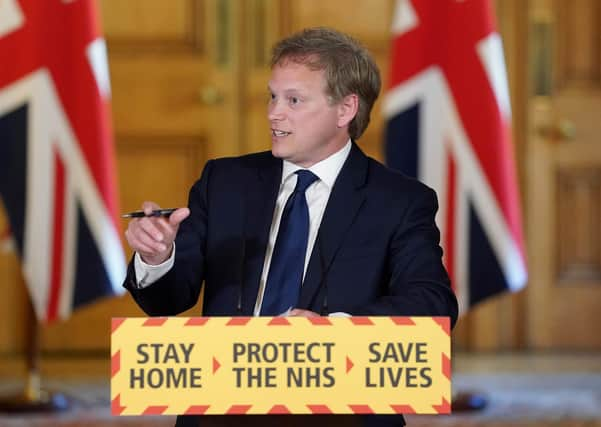More testing at very start would have saved lives, minister admits


The Transport Secretary said “many things” could have been different if the UK’s testing capacity was above 100,000 before Covid-19 spread in the country. More than 28,000 people have now died after testing positive for the virus in the UK.
Mr Shapps also confirmed the NHSX contact tracing app – which he said would need 50-60 per cent of people to use for it to be successful – will be trialled on the Isle of Wight this week before being rolled out later this month.
Advertisement
Hide AdAdvertisement
Hide AdThe app will be central to the government’s efforts in slowing the spread of coronavirus and will involve alerting people who have been in contact with an infected person and asking them to self-isolate.
In an interview with BBC One’s The Andrew Marr Show, he was asked whether fewer people would have died if testing capacity had been greater sooner.
Mr Shapps replied: “Yes. If we had had 100,000 test capacity before this thing started and the knowledge that we now have retrospectively, I’m sure many things could be different.
“The fact of the matter is this is not a country that had – although we’re very big in pharmaceuticals as a country – we’re not a country that had very large test capacity.”
He also revealed that he was “actively looking at” quarantining people travelling to Britain from abroad to keep coronavirus infection rates under control.
The Prime Minister has pledged to set out a “comprehensive plan” on how the current lockdown may be eased on Thursday, when the government must legally review the measures.
Mr Shapps cautioned that life would not return to how it was in February, before the social distancing measures were introduced.
He told Sky’s Sophy Ridge On Sunday: “I don’t think we should expect us to go from this situation that we have at the moment of social distancing back to where we were in February. That’s clearly not going to happen and I don’t think anyone imagines that for one moment.
Advertisement
Hide AdAdvertisement
Hide Ad“The most important thing is that the absolute focus of what the Prime Minister will be announcing later in the week is that what we do do going forward doesn’t undo the brilliant work people have been doing to get that R number below 1 –the all-critical reproduction rate doesn’t come back up because that’s when we’d see a second spike.
“So, no, I’m afraid it is definitely not going to be business as usual but we do want to make sure that people understand where the routemap lies.”
New figures yesterday showed the number of daily tests being carried out for coronavirus in the UK has fallen to below 80,000.
Statistics published by the government indicate that a total of 76,496 were carried out in the 24 hours up to 9am on 3 May.
On Friday, Health Secretary Matt Hancock announced that the government’s target of 100,000 tests a day by the end of April had been achieved, with more than 122,000 tests having been provided on the last day of the month.
Since then, the number has dropped by about 40,000 according to official statistics.
Overall, a total of 1,206,405 coronavirus tests have been carried out in the UK since the beginning of April.
In the government’s daily briefing yesterday, Chancellor of the Duchy of Lancaster Michael Gove said that steps taken to extend testing would help get more people back to work.
Advertisement
Hide AdAdvertisement
Hide AdHe said: “We have now of course extended the criteria for testing beyond key workers to anyone over 65 displaying symptoms, and anyone who has to travel to get to work.
“And this week, we will be piloting new test, track and trace procedures on the Isle of Wight with a view to having them in place more widely later this month.
“All of these steps will help us to get more people back to work and help to support the delivery of our public services.”
On the testing figures, NHS England’s national medical director Professor Stephen Powis said: “Testing capacity has ramped up very quickly and we are now at a very high level of testing, over 100,000 – a little bit of a dip in the weekend, but we anticipate that that testing capacity will continue to increase.”
Comments
Want to join the conversation? Please or to comment on this article.